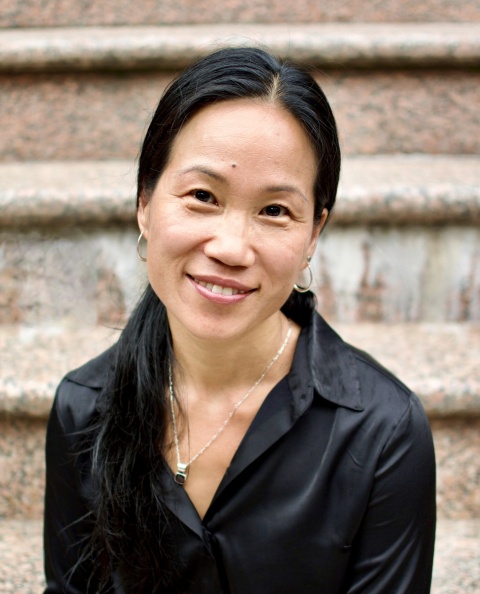Columbia College | Columbia University in the City of New York
Sonya Chung ’94 Steps into Film Forum’s Spotlight

Patrick Quarterman
Film Forum celebrates both indies and classics; when I stopped by the West Village cinema, its four screens were showcasing the wide variety of experiences a viewer can have. There was a remastered showing of Jean-Luc Godard’s 1963 French New Wave film Contempt; a new documentary about Italian scholar and writer Umberto Eco; and a clever double feature — 1969’s Midnight Cowboy alongside a documentary about its creation, Desperate Souls, Dark City and the Legend of Midnight Cowboy. “We’re a nonprofit and we’re a movie house; it’s kind of a weird animal,” Chung says. “The nonprofit part means we’re mission-driven; whatever goes on our screens is very much programmed by people who have knowledge, experience and passion for cinema. While people might not love everything we do, they have faith and confidence that whatever the film that goes up here, this staff has put a lot of thought into deciding that it deserves to go up here.”
Stepping into her predecessor Karen Cooper’s shoes is a big move, but one for which Chung is eminently qualified: She has the passion (she watches anywhere from 300 to 400 movies a year!) as well as the experience. She started working with Film Forum in 2003 as part of the development team, and loved the organization and its mission. After she left the job in 2008 to finish her first novel, she stayed in touch as a patron and member. In February 2020, she returned as Film Forum’s deputy director and helped the organization weather the storm brought on by Covid-19, which closed the physical theater for 13 months.
For Chung, that experience highlighted the importance of the unique theater — which is funded by both ticket sales and donations — and the need to nurture and grow its devoted community of supporters. Her team has been working hard on audience development with the goal of reaching new demographics and a new generation of filmgoers, including those who might be used to watching everything through streaming services on small screens. In addition to its ever-evolving film lineup, Film Forum also hosts Q&As with filmmakers and film-centric community events to create a true experience around going to the cinema. “The pandemic made a lot of institutions think more about community and connectedness,” Chung says. “And it’s not about just young people. I think it’s everyone who was ready for their arts experiences to be not unilateral.”
She continues, “I wish people would give it a chance. To experience what it’s like to sit in the theater, either to see a new film or a classic in a restored print — the lights go down, there’s popcorn, you’re with lots of other people — it’s just really, really magical.”
Chung, a history major, says that the Core Curriculum prepared her for her current role in ways she couldn’t have predicted. “What it takes [to do this job] is, on some level, to just have a voracious curiosity about every subject matter under the sun, and a desire and an interest in learning about new things in aesthetically innovative and excellent ways. And given that, the best liberal arts education is the best preparation — to be curious, and to understand aesthetics and analysis.”
She is also an accomplished writer, with two novels (2010’s Long for This World and 2016’s The Loved Ones) and numerous essays under her belt. “Independent film has been such an important nourishment for me as a writer,” Chung says. “Film and cinema are such a great teacher for storytelling, narrative, character, structure and all of that.
“This might be an overwrought metaphor, so forgive me, but having written two novels is actually not completely irrelevant experience [for this role], in that you commit to a project that is bigger than what you can quite imagine at the beginning. Some of it turns out the way you think it will and some of it doesn’t, but you just keep showing up, and you have faith in the big picture.”
More “Online Spotlights”
- 1 of 3
- ›

